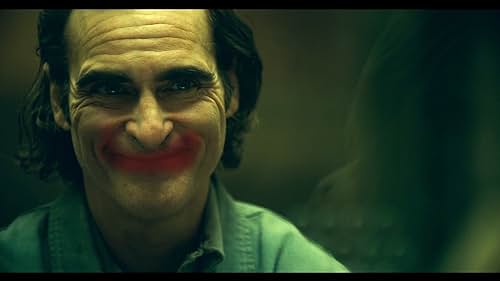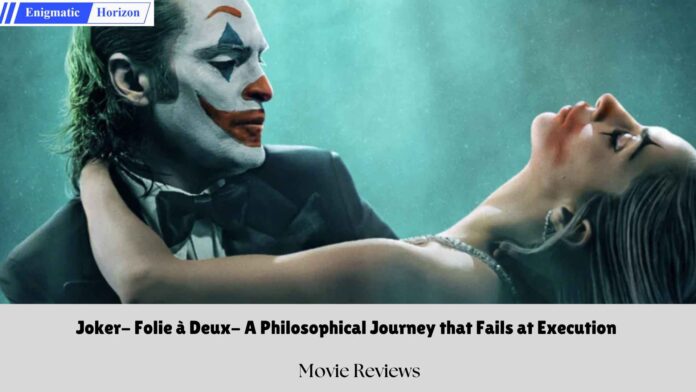Robin Bhuyan
Joker: Folie à Deux, the much-anticipated sequel to Todd Phillips’ 2019 phenomenon Joker, released on 2th October 2024, exactly five years after the prequel. Fans of DC and Joker, as well as people who are into psychological thrillers were expecting a lot from this film, especially considering the subpar movies we have been getting lately, whether we talk about the superhero genre or other genres.
The film continues the story of Arthur Fleck aka Joker, portrayed masterfully by Joaquin Phoenix, who even won the Oscar for his performance in the prequel. The film attempts to explore the depths of his psyche while introducing a new character- Harley Quinn- his love interest. However, while the film did promise us an interesting theme, the execution was half baked.
A Mixed Bag of Genres
From the very beginning, it’s apparent that Folie à Deux is not simply a straightforward continuation of Arthur’s story. Instead, it blends various genres—a psychological thriller, as well as a courtroom drama infused with musical numbers featuring both Joaquin Phoenix and Lady Gaga as Harley Quinn. Phillips has repeatedly claimed that this isn’t a strict musical, yet the film leans heavily on song-and-dance sequences that often disrupt the narrative flow. While the original Joker was steeped in raw emotionality, the sequel’s shift in tone may leave some fans longing for the gritty realism that we saw in the prequel.
Although the film tries to dive deeper into Arthur’s mind, for a huge part of the film, viewers might find themselves tapping their feet impatiently, waiting for the story to get back on track. This lack of cohesion detracts from the emotional weight that could have been carried throughout the film.

The Quest for Identity
At its heart, Folie à Deux grapples with Arthur’s quest for identity. Arthur Fleck is portrayed as a man who has endured neglect, loneliness, and a desperate longing for love. Despite the chaos he creates as the Joker, there’s an undeniable human longing beneath the madness. His relationship with Harley Quinn offers an interesting exploration of love, and acceptance of each other’s’ insanity. However, at times, the relationship feels superficial and lacks the depth that is needed to fully connect with the audience.
Arthur’s transformation into the Joker is shown both a curse and a shield against a world that has continually tortured him. It raises compelling questions about identity and societal perception, yet it often seems more interested in spectacle rather than deep emotional engagement. This results in a narrative that doesn’t connect with the audience much, despite having a lot of potential. This makes us wonder- Why was a sequel even necessary? Joker itself was a masterpiece on its own, and there was no need for a second part, unless it could match the artistic excellence of the first one. This reminds us of movies such as Matrix and American Psycho, which are still considered cult classics, but both movies were ruined by terrible sequels that ruined the genius of the original.
Did the critics miss the core message of the film?
One of the most profound themes Folie à Deux touches upon is the nature of fame and the public’s fascination with violence and revenge. Arthur becomes a symbol of rebellion against a broken system, but the adoration he receives is directed at the Joker—an emblem of chaos and destruction—rather than the helpless and vulnerable man beneath the mask, who longs for love, validation and respect. This distinction is crucial; Arthur wants nothing but respect and recognition for his true self, yet he finds himself celebrated for his horrific acts as the Joker.
Arthur’s tragedy is not solely his transformation but rather the realization that the world never embraced him for who he was, including the woman – Harley, who was hugely fascinated by him, and with whom he fell in love. Instead, he became a figure admired for the chaos he incited rather than the pain he had endured. This shows us that what he believed initially is actually true- the world didn’t really care about him, but rather about violence and revenge.
Despite having a brilliant philosophical theme, Folie à Deux risks tarnishing the legacy of Joker by not adequately addressing the profound psychological insights that made the first film connect with the audiences. The biggest flaw is that the film doesn’t take any stand on who Arthur Fleck is- The Joker or just a lonely broken man? This is one of the major reasons the execution feels lacking, and it leaves majority of audiences and fans with a sense of dissatisfaction.

Does Joker glorify violence?
In conclusion, Joker: Folie à Deux had the potential to provide audiences a fantastic philosophical exploration and delve into the mind of the Joker, but ultimately the movie lands as an average sequel that fails to match the brilliance of its predecessor. For a movie series about a character who promotes anarchy, the ending of the movie might seem fitting, but it will definitely lead to a huge debate among fans. At the same time, the ending puts an end to the debate that the first movie was trying to glorify anarchy and violence. Many critics forget that Joker is a villain, so the first part was basically creating a compelling story for how villains are born. Considering that, it doesn’t seem like the creators were trying to justify or promote any of his actions.
The film raises important questions about identity, societal perception, and the nature of love, yet it struggles to provide a clear narrative direction. While fans may find value in the film’s exploration of Arthur Fleck’s character, unfortunately it lacks what made the first film so outstanding.
Yes, Joker: Folie à Deux is worth a watch, especially those who want to see how Arthur’s journey continues. But do not expect too much from the movie, as it is only another reminder as a reminder that while sequels can offer more of what we love, they can also risk ruining the original, and what made it so special.
Rating 6.5 out of 10 stars
